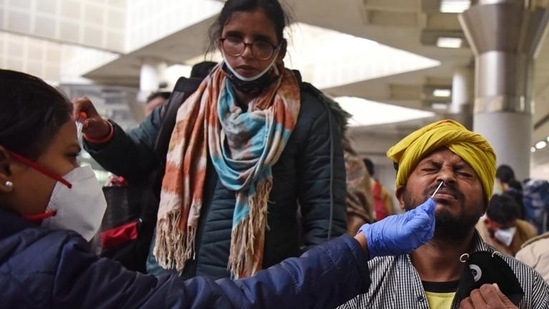Omicron likely to make vaccine update inevitable
On January 12, a coalition of medical regulators from 37 countries and regions (including all of EU, UK, US and India) agreed that there was now a need to reconsider the current vaccine design.
The evolution of the Sars-CoV-2 into the Omicron variant appears to represent a turning point long expected by scientists: coronavirus vaccines will need to be updated.

The most significant endorsement of this understanding came after a meeting on January 12 when a coalition of medical regulators from 37 countries and regions (including all of EU, UK, US and India) agreed that there was now a need to reconsider the current vaccine design.
In a statement after the meeting, the International Coalition of Medical Regulatory Authorities (ICMRA) along with the World Health Organization (WHO) urged the scientific community to begin exploring what are called multivalent or bivalent vaccines, which in other words refers to shots that are designed on the basis of not one but two or more configurations of the virus.
The evidence
There are several studies but they can largely be whittled down to observations in two settings: the lab and the real-world. Lab results from early on in the Omicron outbreak have shown that the antibody response from two shots is almost completely sidestepped by the new variant.
A more detailed analysis of why there is such a drop in the ability of antibodies from a primary vaccination course was published this week after peer-review in the journal Cell. Carried out by researchers from La Jolla Institute it found that memory B cells, which churn out antibodies, could recognise only 42% of the heavily mutated virus.
And this has been borne out in real world data: in its latest variant surveillance report, the UK Health Security Agency last Friday said protection from symptomatic infection drops to 18-20%. Booster doses helped lift this protection to 65-70%, but even that begins to fall, reaching just under 50% teen weeks after a third shot.
The WHO has set 50% as the floor for effectiveness against symptomatic disease for a successful vaccine – a bar that all shots clear when it comes to the ancestral virus that spread of Wuhan. But variants mean that bar has become tougher to reach.
What about current doses?
They are still extremely effective against severe disease or death. For instance, the UKHSA data showed that even when they had just 18-20% against illness, they offered a much higher 65% protection against needing to visit a hospital. This rose to 92% right after a booster dose of the current vaccine.
The LA Jolla study explains why this happens. T cells, which root out the virus from the body after an infection, retain up to 85% of their ability even against the Omicron variant. In other variants, even if current vaccines don’t stop an infection as well, they are significantly more capable in protecting against the worst of Covid-19.
What next?
Israel is now among the first nations to roll out a second booster shot – a fourth dose – to combat the erosion in protection by the Omicron variant. The ICMRA said repeated boosters are not a feasible approach and vaccine makers should begin work on multivalent or bivalent doses.
What strengthens the ICMRA’s position is not only evidence like the waning of boosters even after 10 weeks, but also the signs that Omicron’s further evolution may offer. The mutant is, expectedly, evolving into offshoots like the BA.2. Although it is not a concern yet, it is under investigation and underscores the inevitability of more mutations that could further erode the efficacy of current vaccines.
The good news is that vaccine makers have been testing multivalent and bivalent vaccines since last year. Moderna has developed and is testing the mRNA 1273.211 – a combination of its original vaccine and one designed on the Beta variant – and the mRNA 1273.213, which is based on the Beta and Delta variants. Similarly, Pfizer-BioNTech is testing the BNT162b2 (B.1.1.7 + B.1.617.2), which is based on the Alpha and Delta variants. Both companies are also working on Omicron-specific shots.
Omicron may finally be too far removed from the evolutionary path that other variants followed, necessitating a new design for vaccines, which till now were almost as good against most variants as they were against the Wuhan-origin virus.






